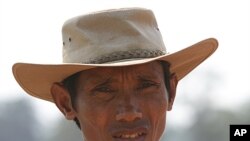Family members and supporters of Chut Wutty, the conservationist who was shot dead in a remote region of Koh Kong province last week, say they will continue his work and seek to protect what remains of Cambodia’s dwindling forests.
The shooting, which also saw the death of a military police officer, has underscored the dangerous work of activists in the arena of illegal logging and deforestation. And even though the government has put together a committee to investigate the circumstances surrounding it, critics say little else is likely to be done.
Chut Wutty was buried on Monday in Kandal province. His wife, Sam Chanthy, said she was happy that “his death was for the sake of the nation.”
“I want my children to be trained to work like their father,” she said, weeping before his coffin. “He did not sell national territory. He just protected the forest for the people in the country and around the world.”
Chut Wutty, who was escorting two journalists and was shot after arguing with military police over photographs taken of suspected illegal logging in the province, was the director of the National Resource Protection Group.
He had become a key activist in the protection of forests in Koh Kong’s Cardamom Mountains, as well as the Prey Lang forest in the northeast of the country. He is survived by three children.
“From today on, the government must find the real killer of my mentor,” Vong Phan, a 60-year-old woman and Prey Lang activist, said at his funeral.
Prime Minister Hun Sen said Tuesday a joint government committee will investigate the shooting.
Officials from the ministries of Interior and Justice, national and military police and the Council of Ministers will investigate the April 26 shootings. Union activists say they want the real killers brought to justice.
Ath Thun, president of the Coalition of the Cambodian Apparel Workers Democratic Union, said union leaders want the joint committee to find the actual shooter.
Authorities initially said the military policeman, In Ratana, shot Chut Wutty before turning a gun on himself. But critics say he was shot twice in the torso, making that scenario unlikely.
“After I listened to the report from authorities, that is not acceptable, and not justice,” Ath Thun said. “So I urge an investigation to find out the real situation and avoid [future] threats to other human rights activists.
Observers in the US also called for Cambodia to thoroughly investigate, or face a continued decline of its reputation.
Naranhkiri Tith, a former professor at Johns Hopkins’ School of Advanced International Studies, said the “mafia-style execution”
should cause concern in the US of its relationship with Cambodia.
“Closing our eyes to something of this tragic nature doesn’t make the US look very good,” he said. “Then the US can lose in the long term because nobody is going to believe in the US.”
Joel Brinkley, author of “Cambodia’s Curse,” said the US is unlikely to risk downgrading its relations status with Cambodia and can do little more in this case than issue a strong statement.
“Cambodia’s reputation in the West is already rather poor, and this just adds to it,” he said. “I hope that people that give aid to Cambodia will keep things like this in mind when they decide whether to give aid which goes to the government.”
A US State Department official said: “The United States will continue to urge Cambodian authorities to undertake a thorough, transparent, and credible investigation into this matter, and that the authorities prosecute anyone found responsible in a similarly transparent and credible manner.”




